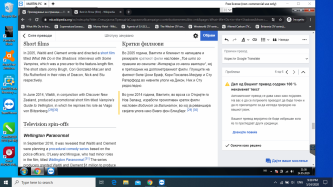The widespread outbreak of the COVID-19 pandemic in the first half of March 2020 was immediately tackled by national lockdowns, travel restrictions and social distancing measures in most countries around the world, which have inevitably led to the cancellation and postponement of many in-person events as well as pronounced echoing of the message #StayHome in the social media. This trend of responses to the global threat was appropriately mirrored in the Wikimedia movement and formalised with a series of announcements by the Wikimedia Foundation to cancel all offline events and focus on online activities until the introduction of the COVID-19 Risk Assessment Protocol in mid-September. In the same vein, an initiative of online activities and events labelled as #StayHome and edit Wikipedia! (or simply #StayHome), running from 15 March to 15 September 2020, was launched on the Macedonian Wikipedia in order to animate its members while home and sustain community growth.
The #StayHome initiative
The idea about the initiative has come from a site notice on the Macedonian Wikipedia with the same text that was announced in order to adapt the community to the new reality and stimulate more active participation in the project. However visible and succinct a message like that can be, its effect is simply insufficient to accomplish the main goal without further efforts. Therefore, a series of online activities with a clear direction towards increasing editors’ activity followed and they collectively developed the #StayHome initiative. These activities consisted of frequently held editing days and editing weekends as writing actions during a 24-hour period and a weekend, respectively, which demonstrated to be a successful model of community engagement in the past couple of years. On top of that, the blitz trainings on how to edit Wikipedia that were carried out offline as part of the project – in English promoted as – Wikisketch went in a new online environment using a remote collaboration software.
Two important details when it comes to organising writing initiatives are the choice of topics that has to interest a large part of the community and the availability of editing materials so that editors could easily write articles. Firstly, taking into account the varying preferences that editors have, the choice fell on a wide variety of topics, ranging from the areas of Science and Arts to Sport and Biographies. There were also topics deliberately chosen to commemorate holidays and observances – in particular, the localised version of the International Roma Day Edit-a-thon that took place during the week around the International Roma Day. Secondly, editors were given instructions on where to look for article titles and were equipped with useful editing materials available on-wiki. The latter, in some sense, has even impacted the choice of topics – namely, a series of ten editing days on archaeological sites located in different parts of Macedonia was arranged thanks to the fact that the community disposed with the Archaeological map of the Republic of Macedonia. Additionally, the work was used as a primary editing material by the newly trained editors through the online blitz trainings.
Outcome and impact
A total of 19 participants – including 4 female and 3 first-time editors – took part in at least one of the 45 editing days, 26 editing weekends or the couple of online blitz trainings provided during the six-month long initiative. They created 1,309 new articles and 40 templates as well as improved 27 existing articles and 1 template. The figure on the newly created articles accounts for roughly 40% of the total new articles on the Macedonian Wikipedia in the same period and it resulted to an increase of the total number of new articles by about 20% compared to the same period last year. Importantly, the newly trained first-time editors remained active after the trainings and occasionally participated in the editing days and weekends.
The success of the #StayHome initiative measured in figures notwithstanding, the way in which the events were organised can exert large impact on the future shape of the projects included. That said, the model of holding editing days twice a week and assigning every weekend of the year proved to work and its implementation is feasible in normal times; in addition, the expanded scope of Wikisketch with online trainings breaks the geographic barrier and supports more extensive future outreach. In a sum, the stated impact of the projects from the initiative paves the way for sustaining long-rung community growth.

Can you help us translate this article?
In order for this article to reach as many people as possible we would like your help. Can you translate this article to get the message out?
Start translation

